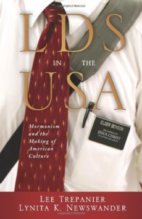How Mormonism Shaped America

To those unfamiliar with the faith, it appears that The Church of Jesus Christ of Latter-day Saints is enjoying a moment of fame in American culture: the 2011 musical, The Book of Mormon, received nine Tony Awards and original Broadway cast recording became the highest-charting Broadway cast album in over four decades; Mitt Romney was the Republican nomination for the presidency in 2012; and Church members in business, sports, and the arts are making headlines. While this attention is perhaps unprecedented, the underlying relationship is not new. Mormons have been shaping our country from the time the religion was founded by Joseph Smith over 180 years ago.
Mormonism was born as the new America was a budding infant, and the religion and the country have followed similar trajectories. It has often been cited as a uniquely “American” religion. But it is also worth considering how “Mormon” America is itself. Following is a short list of contributions the Mormon religion has made to our nation:
1. In American popular culture, Mormons are seen both as the paragon of American family values and as strange, secretive, and suspicious – both the favorite family next door and the mysterious cult across town. Popular culture has been a primary vehicle in leading Americans to this variegated understanding of Mormonism. The clean-cut, wholesome values of Donnie and Marie are juxtaposed with oft-criticized television shows like HBO’s Big Love. Today’s most notable Mormons appeal to the American imagination precisely because they represent a safe, conservative America while at the same time remaining not fully understood.
2. Until the federal government’s attempt to end polygamy in Utah, a national standard for marriage did not exist. The government’s decision to engage polygamy on a national scale would prove to be largely significant for the relationship between national and states’ rights. The federal government intervened into what had always before been the jurisdiction of the states, not to mention that it was also encroaching into what had before been seen as a private or religious matter. The struggle between church and state did not begin or end with Mormonism, but it has arguably dealt with this conflict on a larger scale than any other religion in America, and the controversy involving the religion has set precedent that continues to inform this debate.
3. Though often at odds with mainline Christian theology, Mormons assert they belong under the umbrella of Christianity, and their societal and political points-of-view are often precisely in line with those of conservatives Christianity. On social issues, some surveys even reveal Mormons as more conservative than conservative Christians. Particularly important for Mormons is the central place the family plays in Mormon beliefs and practices, something they hold in common not only with mainstream Christians but also with most people in the United States. Another area that Mormons have in common with mainstream Christians may not be well known is the importance of charity in Mormon beliefs and practices. Mormons are one of the most charitable groups in America, although this is not well-known.
4. Mormonism is quintessentially American. Not only did Mormonism originated in the United States, but it carved out a special place for America in its theology. For example, the U.S. Constitution was seen by Joseph Smith as a divinely-inspired document from God. Although there are some religions that claim the United States has a special, divinely-anointed place in the world – a “city on a hill” – Mormonism is unique in that its origins are only American, and not from Europe or the Middle East. The irony for Mormons is that, in spite of their American origins and the special place they hold for the United States, they have been persecuted by their fellow Americans and, as a result, they had to flee the country in order to practice their religious beliefs. Mormons consequently reflect the irony of the American values of religious tolerance and pluralism. By renouncing polygamy and adopting wholesome, family values, the Mormons have sought to be fully accepted into mainstream American society and culture. However, being accused of religious intolerance and socially homogeneous by mainstream America, Mormons actually reflect the American public’s own religious intolerance and rejection of pluralism.
See our book, LDS in USA: Mormonism and the Making of America and its review; also see “Mormons in the American Imagination,” “An American Marriage: Mormons, Polygamy, and Federalism,” “Liberal Democracy and Mormon Culture,” “Mormon Authority and Identity in America,” and “The Transformation From Theocracy to Democracy in Utah.”




